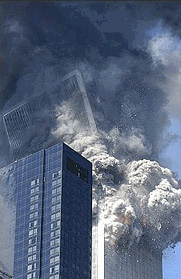

Soc 450: Contemporary Global
Issues
Fall 2002
Instructor: Dr. Gonzalo Santos
Tue. & Th., 10:30 am - 12:35 pm, DDH-K101
Dr. Santos' Office: DDH-AA205
Phone: 664-2191
Office Hours: 2:00 pm to 4:00 pm, Tue. & Th.
Web Homepage: http://www.csub.edu/~gsantos/
 Email: santos_class@csub.edu
Email: santos_class@csub.edu

Texts:
- Calhoun, Craig, Paul Price, & Ashley Timmer, eds.. 2002. Understanding
September 11. New York: Social Science Research Council.
- Hertz, Noreena. 2001. The Silent Takeover. Global Capitalism and
the Death of Democracy. New York: The Free Press.
- Tomlinson, John. 1999. Globalization and Culture. Chicago: The
University of Chicago Press.
- Massey, Douglas S., Jorge Durand, & Nolan J. Malone. 2002. Beyond
Smoke and Mirrors. Mexican Immigration in an Era of Economic Integration.
New York: Russell Sage Foundation.

Course Content:
This course on contemporary global issues will focus, in the same order
as the textbooks listed above, on four broad areas of great importance and
urgency to the world today: (a) the post cold war unfinished transition to
a newly structured world order for the 21st century, a most traumatic and
dangerous process barely begun and barely discernible, exemplified by the
September 11 attack and its ripple effects still unfolding; (b) the mega
corporate stronghold on what has lately come to be known as globalization,
and its tremendous impact on all aspects of social life, including the reorganization
of political life away from democratic principles of power, accountability
and participation; (c) the perplexing "cultures of globalization", and the
challenges posed by the rise of an worldwide consumer culture on all forms
of intersubjectivity, such as national identity, local cultures, and the
various forms of experiencing everyday life; and (d) the causal relationship
between, and immense challenge posed by, accelerated regional economic integration
and the modes of human migration, especially unauthorized migration across
international borders. We focus on the U.S.-Mexico case.
Course Structure:
The course will be run as a seminar. Students in groups of three or four
will take turns introducing and analyzing the assigned readings for each
session, followed by class discussion. Attendance is mandatory (please, no
tardiness or early departures, as these will be penalized) and all
students must come prepared to discuss the readings - either with their presentations
or with their reading assessments if they are not presenting. The presentations
and Dr. Santos comments will take the first hour of class time; after a brief
break, Dr. Santos will randomly select questions or comments from the reading
assessments so that focused class discussion may ensue. Copies of both presentations
and reading assessments must be turned in to Dr. Santos at the beginning
of each class session.
The student groups will also produce two research volumes on issues related
to the course.
Class Presentations:
At the beginning of the course, all students will be organized in groups
of three or four. Every class, a student group will present the assigned readings
of the day: each presenting student will introduce and summarize his/her
own pre-arranged selection of the readings, and raise key issues and questions
for subsequent discussion. Time allotted per individual presentation will
be 10-to-15 minutes. Each student must provide the class with enough copies
of a one-or-two page outline of his/her presentation, including three-to-four
questions or focused issues to discuss (please put these at the end). Please
put on top your name, the date & class, and identify the reading selection
you are presenting on. The outline should use roman numerals for main areas
of the presentation (I., II., III., etc.), with lower-case letters -- a),
b), c), etc. -- for subtopics; avoid narratives and paragraphs and focus
on well-organized titles and subtitles. At least there ought to be an introductory
section identifying the topic(s), a bulky section going over the main points
or areas or findings, a summary section, and a section for questions/issues
for discussion. It is strongly recommended students bring their full presentations
written up in cards that follow the order of the topics and subtopics. Visual
aids - big charts, overhead slides, etc. - may be included in the presentations.
Reading Assessments:
All students must come to class prepared to discuss all assigned readings
for the day. To ensure that they do, students who are not presenting
must bring to class a written "reading assessment" of the assigned readings
for the day of no more than a page and a half. No late reading assessments
will be accepted unless the students has an authorized absence from Dr. Santos.
This reading assessment must not summarize or describe the readings,
but must personally and critically respond to what the student
read: it should identify the areas of strong agreement and disagreement with
the author, as well as the areas of profound learning interest, or amazement,
or perplexity, or surprise. In doing so, you should explain your specific
analytical and personal reasons. The reading assessment need not cover
every issue found in the assigned readings for the day, but it should demonstrate
you read them all. A very bad assessment will reveal the student read very
superficially just to do the assignment (it's called "going through the motions")
or read well only a very small portion of the readings. A good assessment
will demonstrate the student really read all the material and did a serious
effort to critically grapple with it. At the end of the reading assessment,
students should list a couple of questions or issues for class discussion.
Research Papers: Each
student group will design, research, and write two research volumes
on topics related to the main areas of the course. Each volume will contain
three or four individual papers related to different aspects of the volume's
topic. The first volume must be on the post-September 11 debate regarding
the nature, dimensions, and directionalities of the present transition in
world (dis)order, as covered by the Calhoun book, and is due on October
31 in class. The second volume can be on any of the areas or topics covered
by the other three books, or other equally urgent global issues, and is due
on Friday, December 6, before noon, at Dr. Santos' office.
All topics - group as well as individual - must be pre-approved by Dr.
Santos: for the first paper, no later than October 15; for the second paper,
no later than November 26.
Each volume should be bound and should include a title page and a table
of content, listing each paper by title and author. Each individual paper
should be between 15 and 18 pages long (excluding the bibliography). For a
precise guide on the paper's format and citation style, go to:
http://www.csubak.edu/~gsantos/guide-paper.html
Each individual paper should pose a central argument, or thesis, or hypothesis
(or a short set of them), and include the following sections: a couple of
pages for an introduction, stating the thesis/topic, as well as the theoretical
approach and methodological framework of the paper; a bulky section on the
relevant historical & contemporary processes, facts, data, related to
the topic; this section should not only be descriptive, but it should
include your critical analysis to explain these things, as
well as other plausible alternative explanations in the literature and your
critique of them; a couple of pages with your summary and main conclusions;
a bibliography; appendices (if any). The bibliography ought to reflect a
significant search on the World Wide Web, as well as consulted books and
scholarly journals in the library. Appendices should include charts, graphs,
and figures covering the pertinent topic - the better selected, relevant,
and more global in nature, the better. No need for a group bibliography -
the papers' own will suffice.
The first research papers may be rewritten and resubmitted for a better
grade when the second papers are submitted.
Grading: Each research paper is worth 35 points (30 for individual
work + 5 for group effort). The class presentations are worth 15 points in
the aggregate. The reading assessments are worth 15 points in the aggregate.
Every absence is penalized by an extra point off besides the zero recorded
for either a presentation or a reading assessment (tardiness/early departures
by 1/2 point). The final letter grade will be assigned, on a scale of 0 to
100, as follows:
94-100 = A
84-86 = B
74-76 = C
90- 93 = A-
80-83 = B-
70-73 = C-
87- 89 = B+
77-79 = C+
65-69 = D
< 65 = F
Office Hours & Communications
with Dr. Santos: All students
are encouraged to visit the instructor during office hours (posted above),
especially to discuss their individual research papers and class presentations,
any question they may have from the class discussions, the textbooks, etc..
Dr. Santos' office hours will be 2:00 pm to 4:00 pm, Tu & Th. Visits
by appointment are also possible, as well as brief consultations by phone.
Email is discouraged for any other business than basic, one-line communications
(e.g., will be absent, thank you's, etc.).

Schedule of Reading Assignments
|
Tuesday
|
Group
|
Thursday
|
Group
|
| 9/24
INTRODUCTION
|
.
|
9/26
Calhoun
Intro. + Articles 1 & 2
Islamic Radicalism
|
.
|
10/1
Calhoun
Articles 5-8
Globalization and 9/11
|
_______
|
10/3
Calhoun
Articles 9-14
New War/New World Order?
|
_______
|
10/8
Calhoun
Articles 15-18
Terrorism & Democratic Values
|
_______
|
10/10
Calhoun
Articles 19-21
Competing Narratives on September 11
|
_______
|
10/15
Calhoun
Articles 22-24
Competing Narratives on September 11
|
_______
|
10/17
NO CLASS
Research Day for Groups
Please arrange to meet with Ms. Christy
Gavin at the library to explore topics
|
.
|
10/22
Hertz
Chapters 1-3
Revolution, livelihood, & power
|
_______
|
10/24
Hertz
Chapters 4-6
At the gate, politics, & voting
|
_______
|
10/29
Hertz
Chapters 7-9
Glitter, evangelicals, & business
|
_______
|
10/31
Deadline for first
group research papers
Hertz
Chapters 10 & 11
Guarding the guards, reclaiming the state
|
_______
|
11/5
Tomlinson
Chapters 1 & 2
Globalization, modernity, & culture
|
_______
|
11/7
Tomlinson
Chapters 3 & 4
Global culture & deterritorialization
|
_______
|
11/12
Tomlinson
Chapters 5 & 6
The media & the possibility of cosmopolitanism
|
_______
|
11/14
Massey
Chapters 1 & 2
Interventions and principles of the machine
|
_______
|
11/19
Massey
Chapter 3
History of Mexico-US migration
|
_______
|
11/21
Massey
Chapter 4
US-Mexican migration 1965-85
|
_______
|
11/26
Massey
Chapters 5 & 6
A wrench and breakdown post 1986 reforms
|
_______
|
11/28
THANKSGIVING HOLIDAY
|
.
|
11/3
Massey
Chapter 7
US immigration in the 21st century: a repair manual
|
_______
|
The deadline for the second group research
papers is Friday, December 6, noon, at Dr. Santos' office or mailbox.
|
.
|
My group number is: _________
Other group members' names/phones/email addresses:
1. _______________________________________________________________________________
2. _______________________________________________________________________________
3. _______________________________________________________________________________
My group's presentations will be on:
Date:
My own presentation will be on this selection (pages):
1. _______________________________________________________________________________
2. _______________________________________________________________________________
3. _______________________________________________________________________________
4. _______________________________________________________________________________


